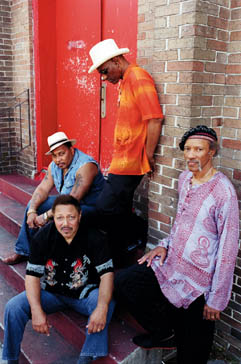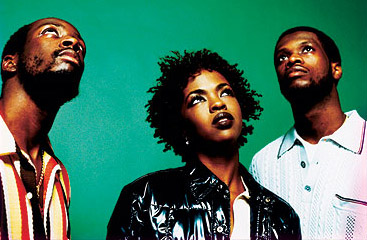NEVILLE BROTHERS / “A Change Is Gonna Come”
Sam Cooke’s “A Change Is Gonna Come” (it’s in this week’s jukebox) was released in 1964, the same year Congress finally passed John Kennedy’s Civil Rights Act, a bill which ostensibly outlawed racial discrimination. Click here for Mtume's interesting interview with Harold Battiste about Sam Cooke’s song.
It’s been more than forty years; I don’t care what textbooks and politicians tell you—racial discrimination is alive and well in America.
I will say though that reality for most Black Americans in 2004 is night-and-day different—meaning, much better—from the reality faced by most Black Americans in 1964. I wasn’t there and I can’t even imagine what it must have been like to face the daily reality of the lynchings, fire hoses, assassinations and false arrests. As such, when I hear “A Change Is Gonna Come,” I hear something different, something more abstract, than what those who listened to it in 1964 must have heard.
 All of the Neville Brothers are old enough to be considered products of the Civil Rights generation, but their remake of “A Change Is Gonna Come” sounds like a remake for the post-Civil Rights generation, my generation. On the original, Sam Cooke’s vocals seethe with indignation—he knows exactly who and what he’s running from and he knows exactly what change it is he’s fighting for. On the remake, Aaron Neville’s vocals sound almost wistful—he knows he’s running from something and he knows he’s looking for something but he doesn’t know what those somethings are. On the original, strings and horns provide both drama and intensity, eventually closing the song in an orchestrated crescendo—there is a sense of finality. On the remake, electronic keyboards and Daniel Lanois’ heavily echoing steel guitar replace the strings and horns. In the background, multi-tracked falsetto vocals sound like a gospel choir coming in from far, far away. There’s no crescendo, no real ending. When it’s done, the song just fades away.
All of the Neville Brothers are old enough to be considered products of the Civil Rights generation, but their remake of “A Change Is Gonna Come” sounds like a remake for the post-Civil Rights generation, my generation. On the original, Sam Cooke’s vocals seethe with indignation—he knows exactly who and what he’s running from and he knows exactly what change it is he’s fighting for. On the remake, Aaron Neville’s vocals sound almost wistful—he knows he’s running from something and he knows he’s looking for something but he doesn’t know what those somethings are. On the original, strings and horns provide both drama and intensity, eventually closing the song in an orchestrated crescendo—there is a sense of finality. On the remake, electronic keyboards and Daniel Lanois’ heavily echoing steel guitar replace the strings and horns. In the background, multi-tracked falsetto vocals sound like a gospel choir coming in from far, far away. There’s no crescendo, no real ending. When it’s done, the song just fades away.
 The Fugees’ version of “A Change Is Gonna Come” [From Greatest Hits – UK Edition (2003, Columbia/Sony – 2CD set)] is neither angry nor wistful. Instead, it is a playful yet sincere tribute to not just Sam Cooke specifically but also to the struggles and perseverance of the Civil Rights generation as a whole. The famous opening lines of the original are:
The Fugees’ version of “A Change Is Gonna Come” [From Greatest Hits – UK Edition (2003, Columbia/Sony – 2CD set)] is neither angry nor wistful. Instead, it is a playful yet sincere tribute to not just Sam Cooke specifically but also to the struggles and perseverance of the Civil Rights generation as a whole. The famous opening lines of the original are:
I was born by the river in a little tent And just like the river, I’ve been running ever sinceOn their remake, the Fugees recast the lyrics like this:
I was born by the river in a tenement And my poor mother, she could hardly pay the rentWhen I first heard Lauryn sing those lyrics, I thought of the New Jersey project buildings that line the Potomac river and the New York project buildings that overlook the Bronx River. I thought about how much has changed over the last forty years and about how little has changed. I thought about how much respect we—meaning, the post-Civil Rights generation—have for our parents and our parents’ parents, how much we appreciate all that they sacrificed for us, even if that appreciation isn’t always expressed appropriately. I also thought about how hip it is that Lauryn and Wyclef seem to be adlibbing throughout. They know Sam’s song well enough that their version sounds as much like a couple of young people reminiscing about their parents as it sounds like a recitation of a classic composition. —Mtume ya Salaam Click here to purchase Yellow Moon
 Flash forward. It’s 2005 and in the mail I get Freedom, a CD from Sunny Sumter, a sister out of the DC area, and one of the cuts is “A Change Is Gonna Come.” Her version is a killer, has both a fierce determination to overcome and a wistful melancholy that lets you know the overcoming is a major struggle that includes a lot of pain and hardship. Viet Nam is now Iraq. Racism has morphed to reveal it’s roots: economic disparity/despair. And, after all the bullshit of the last 35-years or so, we are still optimistic that a change is going to come. Thus, even in this new context the song is still relevant, indeed, perhaps even more relevant, because after all that change that has already come, we all know/need/desire yet another level of change, and from somewhere comes our belief, indeed our metaphysical knowledge that somehow, a real, for real change is definitely gonna come. Or at least that is what the music says to me.
—Kalamu ya Salaam
Black N' Blue
Yeah. The Sunny Sumter version is by far the most blue—as in “what did I do to get so black n’ blue”—version of all. I hear a little of everything/everyone in Sunny’s song – echoes and undertones of great singers and players past and present: Cassandra Wilson, Ray Charles, Dionne Farris, Robert Johnson, Tracy Chapman, Albert King and even Sister Mavis Staples. Now that’s a hip, hip blues.
—Mtume ya Salaam
Tunneling through
What I think it is, is that Sunny is a thirty-something adult working in the tradition, which puts her out of step with today’s popular musical culture, especially the music business that is, at this time, overtly hip-hop in its orientation. In general, there ain’t no record deals for no young, Black jazz/traditional singers.
Although it’s no easy promenade for anyone, it be especially hard for non-blond women to build a career as a jazz singer in the 21st century, particularly if they’re not presenting themselves as sex symbols.
Not only is there no light at the end of the tunnel, there ain’t even no tunnel. You got to dig your own damn tunnel with only a teaspoon as a pick and a shovel. Making it singing in the tradition is just that hard right now, and so, while the song Sunny is singing has historical roots and references, her work is also a literal self-portrait of a sister in blue, a sonic declaration that she's going to keep on keeping on even though it be super-hard. She deserves/has earned our admiration and support.
—Kalamu ya Salaam
To visit Sunny Sumter’s website click here: www.sunnysumter.com
Flash forward. It’s 2005 and in the mail I get Freedom, a CD from Sunny Sumter, a sister out of the DC area, and one of the cuts is “A Change Is Gonna Come.” Her version is a killer, has both a fierce determination to overcome and a wistful melancholy that lets you know the overcoming is a major struggle that includes a lot of pain and hardship. Viet Nam is now Iraq. Racism has morphed to reveal it’s roots: economic disparity/despair. And, after all the bullshit of the last 35-years or so, we are still optimistic that a change is going to come. Thus, even in this new context the song is still relevant, indeed, perhaps even more relevant, because after all that change that has already come, we all know/need/desire yet another level of change, and from somewhere comes our belief, indeed our metaphysical knowledge that somehow, a real, for real change is definitely gonna come. Or at least that is what the music says to me.
—Kalamu ya Salaam
Black N' Blue
Yeah. The Sunny Sumter version is by far the most blue—as in “what did I do to get so black n’ blue”—version of all. I hear a little of everything/everyone in Sunny’s song – echoes and undertones of great singers and players past and present: Cassandra Wilson, Ray Charles, Dionne Farris, Robert Johnson, Tracy Chapman, Albert King and even Sister Mavis Staples. Now that’s a hip, hip blues.
—Mtume ya Salaam
Tunneling through
What I think it is, is that Sunny is a thirty-something adult working in the tradition, which puts her out of step with today’s popular musical culture, especially the music business that is, at this time, overtly hip-hop in its orientation. In general, there ain’t no record deals for no young, Black jazz/traditional singers.
Although it’s no easy promenade for anyone, it be especially hard for non-blond women to build a career as a jazz singer in the 21st century, particularly if they’re not presenting themselves as sex symbols.
Not only is there no light at the end of the tunnel, there ain’t even no tunnel. You got to dig your own damn tunnel with only a teaspoon as a pick and a shovel. Making it singing in the tradition is just that hard right now, and so, while the song Sunny is singing has historical roots and references, her work is also a literal self-portrait of a sister in blue, a sonic declaration that she's going to keep on keeping on even though it be super-hard. She deserves/has earned our admiration and support.
—Kalamu ya Salaam
To visit Sunny Sumter’s website click here: www.sunnysumter.com
This entry was posted on Sunday, July 3rd, 2005 at 12:03 am and is filed under Cover. You can follow any responses to this entry through the RSS 2.0 feed. You can leave a response, or trackback from your own site.
7 Responses to “NEVILLE BROTHERS / “A Change Is Gonna Come””
July 6th, 2005 at 8:15 am
I’d only heard Sam Cooke’s version, and the Fugees.
But the Neville Brothers and Sunny Sumter are great also. I think I can listen to anybody sing this song. Thanks for putting them up.
July 8th, 2005 at 2:24 am
Much thanks for posting the interesting interview on “A Change…”. The opening lines of this song always grab me. Another great version, and my favorite besides the original is the Al Green live version which is done in a much more emotional and unrestrained fashion. Anyone who is a fan of Sam Cooke should see the movie Ali, which uses his songs as the catalyst for some of the films most striking scenes.
July 8th, 2005 at 8:36 am
This goes back to having old eyes and young eyes: the Sam Cooke version has broguht tears to my eyes and the Fugees version rocks me. The way they are done speak to me in different ways but when you put them together, I feel like something in their sounds could sum up something about our generation. Maybe something about dealing with the gains Mtume wrote about and what would be done with them by us, the Post Civil Rights babies. Great music!
July 8th, 2005 at 4:09 pm
First of all, thanks for the excellent blog! I liked reading about what “A change is gonna come” means to you. That really is one very moving piece of music. Otis Redding has recorded a superb take, which is to be found on “Otis Blue”. It is less heavily orchestrated than the one by Sam Cooke and has a rawer, less optimistic feel to it, which I find particularly compelling.
July 10th, 2005 at 1:19 pm
Sunny Sumter’s version of “A Change is Gonna Come” makes me believe in god. i mean, there i was, looking for god in church and the mosque, and/or in the Movement. And, all his time, s/he was in my ear… dig?
January 4th, 2008 at 12:13 am
Man, after listening to Barack Obama’s awsome Iowa victory speech tonight, 1/3/08, I went immediately to the Neville Brothers’ recording of “A Change is Gonna Come” and played it over and over and over. This should be the theme song on Obama’s road to the White House!
November 7th, 2008 at 7:54 am
A beautiful post! Thank you for sharing this!
I first heard the Cooke’s song when I was 10 years old, and it brought tears to my eyes… the lyrics were and still are powerful, but it carried a sense of death, yet hope at the same time.
I’m from London, but currently living in Japan (Jamaican/English), and when I found out about Obama’s victory… I hugged the closest person next to me. As soon as I got home, I played Sam Cooke’s ‘A Change Is Gonna Come’, loudly… held me my wife, looked at my children and cried in absolute joy.
Leave a Reply
| top |